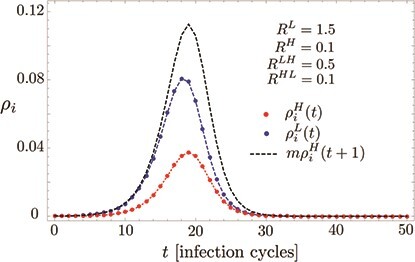Synchronization in epidemic growth and the impossibility of selective containment
IF 1.5
Mathematical medicine and biology : a journal of the IMA
Pub Date : 2021-09-01
DOI:10.1093/imammb/dqab013
引用次数: 0
Abstract
Containment, aiming to prevent the epidemic stage of community-spreading altogether, and mitigation, aiming to merely ‘flatten the curve’ of a wide-ranged outbreak, constitute two qualitatively different approaches to combating an epidemic through non-pharmaceutical interventions. Here, we study a simple model of epidemic dynamics separating the population into two groups, namely a low-risk group and a high-risk group, for which different strategies are pursued. Due to synchronization effects, we find that maintaining a slower epidemic growth behaviour for the high-risk group is unstable against any finite coupling between the two groups. More precisely, the density of infected individuals in the two groups qualitatively evolves very similarly, apart from a small time delay and an overall scaling factor quantifying the coupling between the groups. Hence, selective containment of the epidemic in a targeted (high-risk) group is practically impossible whenever the surrounding society implements a mitigated community-spreading. We relate our general findings to the ongoing COVID-19 pandemic.


流行病增长的同步性和选择性遏制的不可能性
旨在完全防止社区传播的流行病阶段的遏制和旨在仅仅“拉平”大范围疫情的缓解,构成了通过非药物干预对抗流行病的两种性质不同的方法。在这里,我们研究了一个简单的流行病动力学模型,将人群分为两组,即低风险组和高风险组,并采取不同的策略。由于同步效应,我们发现,对于两组之间的任何有限耦合,高危人群保持较慢的流行病增长行为都是不稳定的。更准确地说,除了一个小的时间延迟和量化两组之间耦合的总体比例因子外,两组中感染者的密度在质量上的演变非常相似。因此,只要周围社会采取缓解社区传播的措施,就不可能在有针对性的(高风险)群体中选择性地控制疫情。我们将我们的总体调查结果与正在进行的新冠肺炎大流行联系起来。
本文章由计算机程序翻译,如有差异,请以英文原文为准。
求助全文
约1分钟内获得全文
求助全文

 求助内容:
求助内容: 应助结果提醒方式:
应助结果提醒方式:


